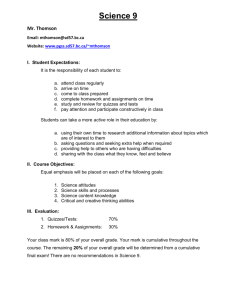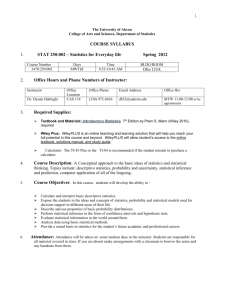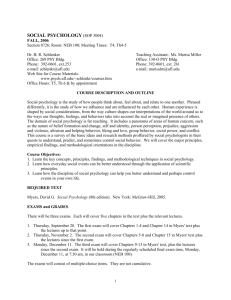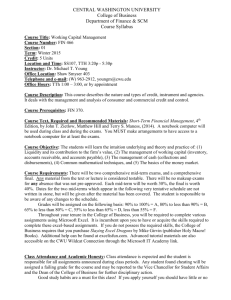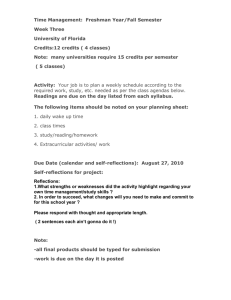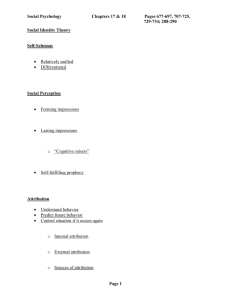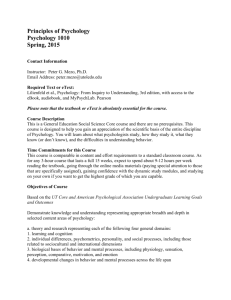PSY 101 26 CAREY FA 11 - Heartland Community College
advertisement
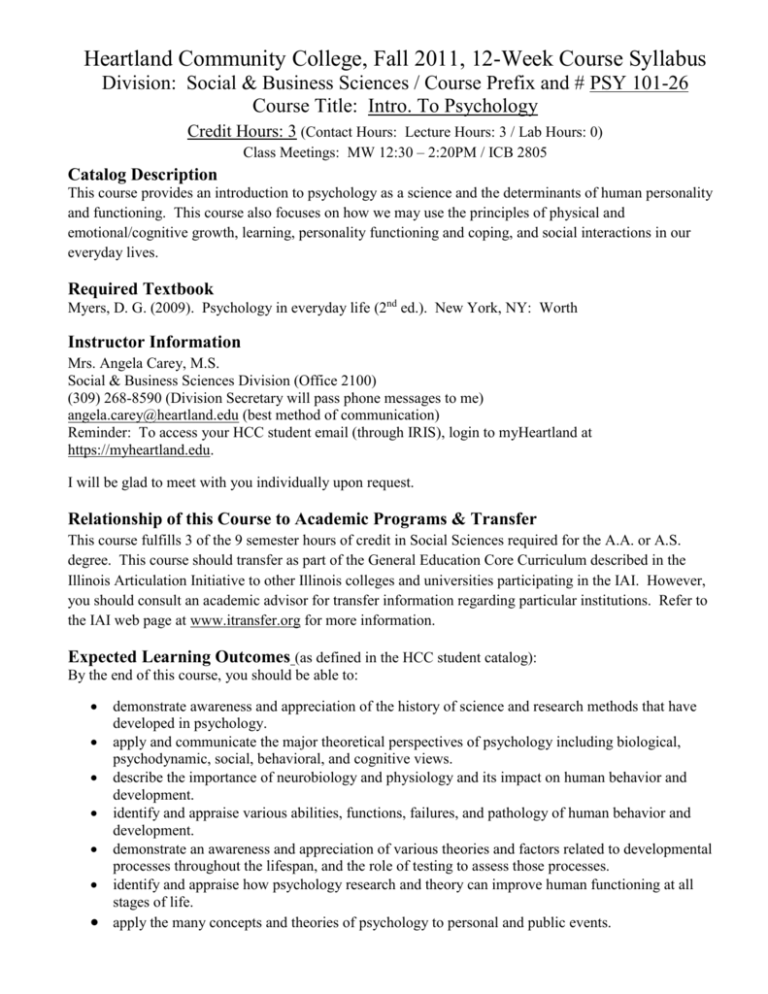
Heartland Community College, Fall 2011, 12-Week Course Syllabus Division: Social & Business Sciences / Course Prefix and # PSY 101-26 Course Title: Intro. To Psychology Credit Hours: 3 (Contact Hours: Lecture Hours: 3 / Lab Hours: 0) Class Meetings: MW 12:30 – 2:20PM / ICB 2805 Catalog Description This course provides an introduction to psychology as a science and the determinants of human personality and functioning. This course also focuses on how we may use the principles of physical and emotional/cognitive growth, learning, personality functioning and coping, and social interactions in our everyday lives. Required Textbook Myers, D. G. (2009). Psychology in everyday life (2nd ed.). New York, NY: Worth Instructor Information Mrs. Angela Carey, M.S. Social & Business Sciences Division (Office 2100) (309) 268-8590 (Division Secretary will pass phone messages to me) angela.carey@heartland.edu (best method of communication) Reminder: To access your HCC student email (through IRIS), login to myHeartland at https://myheartland.edu. I will be glad to meet with you individually upon request. Relationship of this Course to Academic Programs & Transfer This course fulfills 3 of the 9 semester hours of credit in Social Sciences required for the A.A. or A.S. degree. This course should transfer as part of the General Education Core Curriculum described in the Illinois Articulation Initiative to other Illinois colleges and universities participating in the IAI. However, you should consult an academic advisor for transfer information regarding particular institutions. Refer to the IAI web page at www.itransfer.org for more information. Expected Learning Outcomes (as defined in the HCC student catalog): By the end of this course, you should be able to: demonstrate awareness and appreciation of the history of science and research methods that have developed in psychology. apply and communicate the major theoretical perspectives of psychology including biological, psychodynamic, social, behavioral, and cognitive views. describe the importance of neurobiology and physiology and its impact on human behavior and development. identify and appraise various abilities, functions, failures, and pathology of human behavior and development. demonstrate an awareness and appreciation of various theories and factors related to developmental processes throughout the lifespan, and the role of testing to assess those processes. identify and appraise how psychology research and theory can improve human functioning at all stages of life. apply the many concepts and theories of psychology to personal and public events. You should also achieve the following General Education Learning Outcomes: Effectively deliver a message via various channels/modalities. Reflect upon the formation of your own perspectives, beliefs, opinions, attitudes, ideals, and values. Solve problems based on examples and frameworks I (as your instructor) provide. Gather knowledge, apply it to a new situation, and draw reasonable conclusions in ways that demonstrate comprehension. Determine the value of multiple sources or strategies and select those most appropriate in a given context. Course Outline: This class will cover material from each chapter of our textbook. We will not spend equal time on each topic addressed. Required Writing: Every psychology course is required to include a minimum of 10 pages of writing from each student to account for no less than 20% of his/her final grade. Methods of Evaluation: Exams: You will be given 4 exams that will account for 60% of your final grade for this course. Chapters will be covered together as follows: 1. 2. 3. 4. Chapters 1 - 4 Chapters 5 - 8 Chapters 9 - 11 Chapters 12 - 14 Quizzes: You will be given 5 unannounced quizzes. These will account for 10% of your final grade. Writing Assignments: You will be expected to write 4 separate papers to complete the 10 total pages of writing required. These will account for 20% of your final grade. You may be given more specific direction for them as their due dates approach. The chapters given for each paper are to help guide your topic, but you will need outside sources to supplement them for the papers. The general topics, however, will be as follows: 1. 2. 3. 4. Any part of development through the life span (Ch. 3) Memory (Ch.7) One of the 4 perspectives of personality (Ch. 11) Something you’ve learned throughout the course of this class. Attendance / Group Projects / Class Participation: Although you will not likely be given grades for individual projects, your participation in them along with your participation during class discussions will be taken into consideration. Additionally, your attendance in this 8am class is crucial. This will account for 10% of your final grade. Grading System: A = 100% - 90% B = 89% - 80% C = 79% - 70% D = 69% - 60% F = 59% and below Course Calendar: The following schedule is an estimation to give you an idea of what to expect and how to plan your semester. These dates are subject to change if we require more/less time on any given chapter. Week 1: Introductions, studying tips (with related assignments), Ch. 1 Week 2: Ch. 2 & 3 Week 3: Ch. 4 / Review for Exam Week 4: Exam 1 (covering chapters 1 - 4) / Ch. 5 Week 5: 1st paper due & Ch. 6 & 7 Week 6: Ch. 8 / Review for Exam Week 7: Exam 2 (covering chapters 5 - 8) / Ch. 9 Week 8: 2nd paper due & Ch. 10 / Ch. 11 Week 9: Ch. 12 / Review for Exam Week 10: Exam 3 (covering chapters 9 - 11) Week 11: 3rd paper due, Ch. 13 & 14 / Thanksgiving break Week 12: Exam 4 (covering chapters 12 - 14) Final Exam: Mon. Dec. 12th at 12p.m. = 4th and final paper due Instructor Policies *We will begin the semester as adults, with the expectation that you will keep your phone turned off during class and will not use it for texting. If anyone disrupts class with a phone, we will change procedures to setting them out on your desks on silent mode. Talk with me before class begins if you have a need to be available by phone. *You will have the opportunity to re-take one of your exams (with the lowest grade) at the end of the semester (on final exam day). *Missed exams may be taken within 24 hours but will automatically receive two grades lower than your original score. If you know in advance that you will be missing an exam day, you may take the exam before the class period. If you have a last-minute illness or emergency, you must leave a message at the above number as soon as possible on the same day. *Missed quizzes may not be made up. *Late papers will be graded with a lowered score equivalent to one-half score for each day it is late. To avoid this issue, turn in assignments by 5pm on the day you miss class or as soon as possible otherwise. You may turn in your paper at the front desk in the Social & Business Sciences Division (ICB 2100). *Your conduct within the classroom is expected to be polite and mature. I reserve the right to determine conduct that does not meet expectations. You will be asked to leave the classroom for the remainder of the class without the option to make up any quizzes or exams. Syllabus Disclaimer: Changes may occur regarding when material is covered, however, changes will not be made in how your grades (including your overall grade) are determined.


